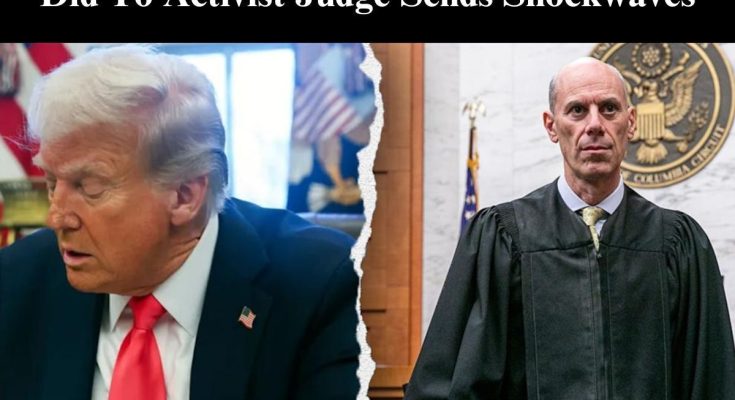On Thursday, a federal judge indicated that the Trump administration did not comply with a court-imposed deadline to provide information regarding deportation flights to El Salvador, escalating the ongoing legal dispute between President Donald Trump and the judiciary.
U.S. District Judge James Boasberg remarked that the government’s attorneys failed to deliver the necessary details about the deportation flights, which involved individuals facing immediate removal under the 1798 Alien Enemies Act, and did not clarify whether they intentionally disregarded his court order, as reported by Fox News.
In a critical ruling issued on Thursday evening, the judge pointed out that the government had “again evaded its obligations” by not presenting the required information, despite being allowed to submit it under seal. The documentation they eventually provided was submitted several hours late and did not sufficiently address his inquiries, according to Fox.
The administration submitted a six-paragraph statement from a regional ICE office director in Harlingen, Texas, which informed the judge that Cabinet secretaries are “actively considering whether to invoke the state secrets [act] privileges over the other facts requested by the Court’s order.”
Boasberg stated, “This is woefully insufficient.”
On Saturday, he issued an emergency restraining order that prohibited the Trump administration from utilizing the 1798 law to deport Venezuelan nationals—including alleged members of the Tren de Aragua gang—for a duration of 14 days. He also mandated that any flights already en route return to U.S. territory immediately.
However, just hours later, a flight carrying hundreds of U.S. migrants, including Venezuelan nationals targeted under the law, arrived in El Salvador.
In response, Boasberg promptly instructed the government to provide further information to the court as part of a “fact-finding hearing” to ascertain whether the Trump administration willfully disobeyed his order and to account for the number of individuals deported, as noted by Fox.
Following the government’s repeated failures to comply, citing concerns related to national security, he mandated that they submit the requested information under seal by noon on Thursday.
Boasberg asked government attorneys to provide comprehensive details regarding the departures that occurred on Saturday, including the number of flights that left the United States carrying individuals deported solely based on that proclamation, the number of passengers on each flight, their destinations, and the specific times and locations of departure.
“Initially, the Government cannot present a regional ICE official to verify discussions at the Cabinet level concerning the state-secrets privilege; indeed, his statement on this matter is, unsurprisingly, founded solely on his unverified ‘understanding,’” he remarked.
Boasberg subsequently instructed the Trump administration to submit a brief by March 25, clarifying why its failure to return individuals on the two earliest flights arriving from El Salvador on March 15 did not breach his order, as reported by Fox.
“By March 21, 2025, at 10:00 a.m., the Defendants are required to provide a sworn declaration from an individual directly involved in the Cabinet-level discussions regarding the invocation of the state-secrets privilege,” he added.
Boasberg had previously cautioned the Trump administration about potential repercussions for violating his order.
Nonetheless, at least one flight carrying deported migrants, reportedly linked to a violent gang, arrived later that evening in El Salvador. “Oopsie, too late,” remarked Salvadoran President Nayib Bukele in a post on X.
In the days that followed, government lawyers have declined to disclose court-related information about the deportation flights or whether the plane—or planes—carrying migrants departed U.S. territory after the judge’s order, citing national security concerns.
White House Press Secretary Karoline Leavitt criticized Boasberg on Wednesday, asserting that the administration views his demands as politically motivated.
“The judge in this case is essentially suggesting that the president lacks the executive authority to deport,” she stated.



